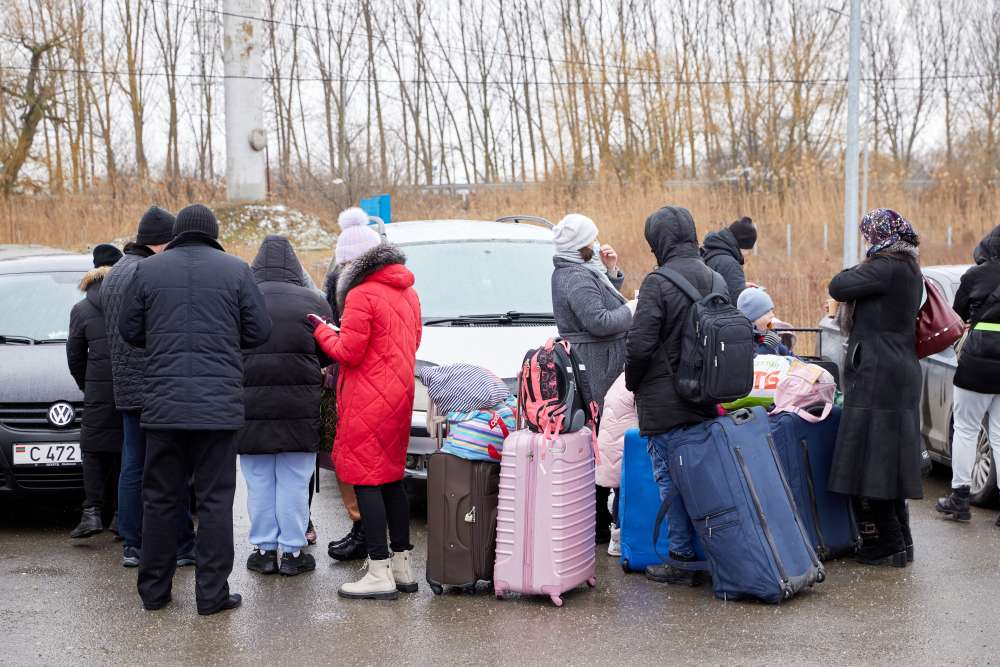Queering Displacement
The State of the Ukrainian LGBTQ+ Community During the Russian Full-Scale Invasion

A scene from the Palanca-Maiaki-Udobnoe border crossing point, between the Republic of Moldova and Ukraine, on March 1, 2022, as people fled Russia’s military offensive.
By MARYNA SHEVTSOVA
04 Apr 2024
Russia’s full-scale invasion of Ukraine has had a drastic impact on the lives of internally displaced people (IDPs). But one subgroup of these Ukrainians is particularly vulnerable: IDPs who identify as LGBTQ+.
Queer IDPs are exposed not only to the challenges that accompany displacement, like discrimination when looking for housing and work, but also to harms stemming from queerphobic violence and stigmatization. These intersectional problems persist despite societal acceptance of LGBTQ+ individuals increasing in Ukraine over the last years.
While international actors already provide support to IDPs and partner with Ukrainian LGBTQ+ rights NGOs, they rarely address the specific needs of queer IDPs. These actors can change that – and make a significant difference for queer IDPs in Ukraine – by funding new and expanded LGTBQ+ shelters and community centers, as well as by increasing access to legal, social and psychological assistance.
The full brief is available for download (in English and soon in Ukrainian).
This is the first policy brief in our series“Feminist Perspectives for Supporting Ukraine.” The corresponding project is supported by the Stabilisation Platform, which is funded by the German Federal Foreign Office. It also builds on GPPi’s previous research on the conflict in Ukraine and feminist foreign policy.
About the author: Maryna Shevtsova is a Senior FWO Postdoctoral Fellow at KU Leuven, Belgium, where she researches LGBTQ+ rights and activism in Central and Eastern Europe, queer migration, and anti-gender movements. She is also the co-founder of Equal Opportunities Platform, a Ukrainian NGO promoting gender equality.
04 Apr 2024
Russia’s full-scale invasion of Ukraine has had a drastic impact on the lives of internally displaced people (IDPs). But one subgroup of these Ukrainians is particularly vulnerable: IDPs who identify as LGBTQ+.
Queer IDPs are exposed not only to the challenges that accompany displacement, like discrimination when looking for housing and work, but also to harms stemming from queerphobic violence and stigmatization. These intersectional problems persist despite societal acceptance of LGBTQ+ individuals increasing in Ukraine over the last years.
While international actors already provide support to IDPs and partner with Ukrainian LGBTQ+ rights NGOs, they rarely address the specific needs of queer IDPs. These actors can change that – and make a significant difference for queer IDPs in Ukraine – by funding new and expanded LGTBQ+ shelters and community centers, as well as by increasing access to legal, social and psychological assistance.
The full brief is available for download (in English and soon in Ukrainian).
This is the first policy brief in our series“Feminist Perspectives for Supporting Ukraine.” The corresponding project is supported by the Stabilisation Platform, which is funded by the German Federal Foreign Office. It also builds on GPPi’s previous research on the conflict in Ukraine and feminist foreign policy.
About the author: Maryna Shevtsova is a Senior FWO Postdoctoral Fellow at KU Leuven, Belgium, where she researches LGBTQ+ rights and activism in Central and Eastern Europe, queer migration, and anti-gender movements. She is also the co-founder of Equal Opportunities Platform, a Ukrainian NGO promoting gender equality.
No comments:
Post a Comment